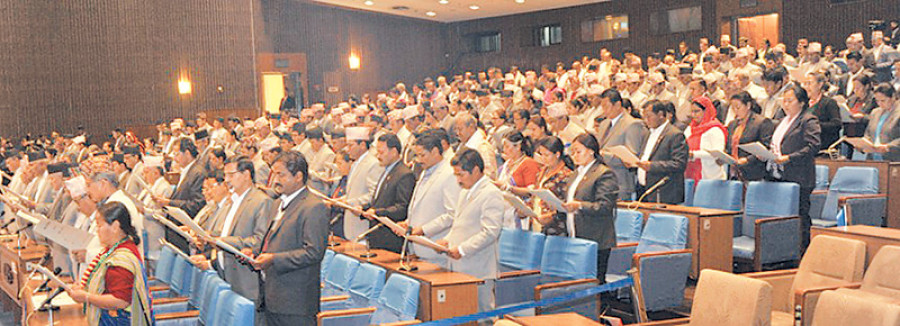National
Parliament has to endorse over 40 new Acts
The federal parliament will have busy sessions this year. It must endorse around 40 new Acts necessary for the full-fledged implementation of the Constitution of Nepal, latest by next year.
Binod Ghimire
The federal parliament will have busy sessions this year. It must endorse around 40 new Acts necessary for the full-fledged implementation of the Constitution of Nepal, latest by next year.
The statute makes it mandatory to frame 110 federal laws and amend 315 others within a year since the commencement of the first meeting of the federal parliament. Those concerning fundamental rights of the citizens have to be drafted within three years since the promulgation of the constitution.
This means the federal parliament needs to endorse all the Acts related to fundamental rights before September 19 while remaining have to be in place by March 4 next year.
Then President Ram Baran Yadav promulgated Nepal’s Constitution on September 20, 2015 and the first meeting of the federal parliament commenced on March 5.
The Ministry of Law and Justice records show around 40 new Acts have to be passed in the stipulated time frame and review 315 other to update them as per the spirit of the constitution.
Provincial parliaments have to endorse 22 while six others need to be approved by the local governments. Around a third of the total 308 Articles in ‘Constitution of Nepal 2015’ need either new Acts and regulations or amendment in the existing legal provisions before implementing them.
Ministry Deputy Spokesperson Hum Bahadur KC told the Post, “We have hardly a year to pass all laws. The existing laws that are not amended as per the spirit of the statute will be annulled after a year.” He said the Ministry has informed Nepal Law Commission to draft the Acts related to fundamental rights while respective ministries will review the Acts related to them.
KC said the previous parliament made changes to 193 Acts while drafted some seven dozen new Acts mainly related to three layers of elections, elections of president and vice-president, different inclusive commissions, Acts to govern and local level and fiscal transformation.
Legal provisions are required for the implementation of around half of fundamental rights, directive principles, various provisions related to state, provincial and local government.
The constitution says the provisions of positive discrimination for the empowerment of marginalised communities, some provisions of right to justice, right to property, free education up to secondary level and special scholarships for students from marginalised communities to higher education, among others, will be implemented as per the new laws.




 11.12°C Kathmandu
11.12°C Kathmandu














